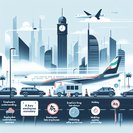
Less than a year after resolving a diplomatic spat over air rights and travel curbs, the United Arab Emirates has quietly imposed a fresh layer of visa restrictions on Nigerian nationals. Industry newsletter D Market Forces reported on 24 November that travel-agent portals received a notice suspending all transit-visa applications and barring Nigerians aged 18–45 from applying for tourist visas unless accompanied by a sponsor or meeting stringent criteria.
Applicants aged over 45 face tough financial hurdles: a personal bank statement showing a US$10,000 monthly closing balance for the past six months is now mandatory. The policy effectively removes spontaneous leisure travel and low-budget stopovers for most Nigerians, a demographic that previously accounted for significant traffic on Lagos-Dubai routes.
![UAE tightens entry for Nigerians: tourist visas restricted, transit visas halted]()
Although UAE authorities have yet to publish an official cabinet decision, the move is consistent with wider risk-profiling efforts that earlier hit other African and conflict-affected states. Mobility managers relocating staff through Dubai as a connecting hub should immediately re-check visa routings for Nigerian passport-holders; the suspension of 96-hour transit visas could necessitate re-booking via Doha or Addis Ababa.
Businesses with Nigerian clients or workforce in the Gulf should also prepare for longer processing times on work-permit conversions, as tourist-to-employment status changes are effectively blocked under the new rules. Legal advisers recommend gathering robust financial evidence and corporate guarantees ahead of any submissions.
Stakeholders warn that the clamp-down may trigger reciprocal measures or push travellers towards informal channels, stressing the need for diplomatic engagement to restore predictable mobility between Africa’s largest economy and the UAE.
Applicants aged over 45 face tough financial hurdles: a personal bank statement showing a US$10,000 monthly closing balance for the past six months is now mandatory. The policy effectively removes spontaneous leisure travel and low-budget stopovers for most Nigerians, a demographic that previously accounted for significant traffic on Lagos-Dubai routes.

Although UAE authorities have yet to publish an official cabinet decision, the move is consistent with wider risk-profiling efforts that earlier hit other African and conflict-affected states. Mobility managers relocating staff through Dubai as a connecting hub should immediately re-check visa routings for Nigerian passport-holders; the suspension of 96-hour transit visas could necessitate re-booking via Doha or Addis Ababa.
Businesses with Nigerian clients or workforce in the Gulf should also prepare for longer processing times on work-permit conversions, as tourist-to-employment status changes are effectively blocked under the new rules. Legal advisers recommend gathering robust financial evidence and corporate guarantees ahead of any submissions.
Stakeholders warn that the clamp-down may trigger reciprocal measures or push travellers towards informal channels, stressing the need for diplomatic engagement to restore predictable mobility between Africa’s largest economy and the UAE.









